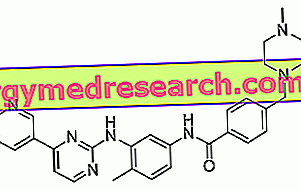Imatinib is an antitumor drug capable of inhibiting the growth of malignant cells.
Indications
For what it uses
The use of imatinib is indicated for the treatment of:
- Chronic myeloid leukemia;
- Acute chromosome-positive acute lymphoblastic leukemia;
- Myelodysplastic or myeloproliferative diseases;
- Hypereosinophilic syndrome and chronic eosinophilic leukemia;
- Malignant stromal tumors of the gastrointestinal tract;
- Dermatofibrosarcoma protuberans.
Warnings

Imatinib - Chemical Structure
Imatinib can only be prescribed to patients by physicians who are specialized in the administration of anticancer agents.
Because imatinib can cause severe fluid retention, patients must be carefully monitored.
During the duration of treatment with imatinib, patients should undergo regular body weight checks and regular blood tests.
Imatinib can be used in children and adolescents for the treatment of chronic myeloid leukemia and for the treatment of philadelphia chromosome-positive acute lymphoblastic leukemia. However, some children and adolescents undergoing imatinib therapy may have slower than normal growth. Therefore - this category of patients - must be carefully monitored.
Before taking imatinib it is necessary to inform your doctor if you are suffering - or have been suffering from - liver, kidney and / or heart problems. It is also necessary to inform your doctor if you are taking levothyroxine following thyroid removal.
Since imatinib can induce drowsiness, dizziness and visual disturbances, driving and using machines is not recommended.
Interactions
The plasma concentration of imatinib can be increased by concomitant administration of the following drugs:
- Indinavir, ritonavir and other antiviral drugs;
- Azole antifungals, such as - for example - ketoconazole and itraconazole ;
- Macrolide antibiotics, such as - for example - erythromycin, clarithromycin and telithromycin .
The plasma concentration of imatinib may be reduced by concomitant administration of the following drugs:
- Dexamethasone, a corticosteroid;
- Rifampicin, an antibiotic;
- Preparations based on St. John's wort (or St. John's wort), a plant that has antidepressant properties;
- Phenytoin, carbamazepine and phenobarbital, drugs used in the treatment of epilepsy.
A lot of caution should be used in concomitant administration of imatinib at high doses and paracetamol .
Imatinib may increase the plasma concentration of simvastatin (a drug used in the treatment of hypercholesterolemia).
Side effects
Imatinib can cause various types of side effects, although not all patients experience them.
The following are the main adverse effects that may occur during therapy with imatinib.
Temporary reduction in blood cell production
Imatinib treatment may cause a temporary decrease in blood cell production. This reduction may cause:
- Anemia (reduced amount of hemoglobin in the blood);
- Leukopenia (reduced number of white blood cells) with consequent increased susceptibility to contraction of infections, even serious ones;
- Plateletopenia (reduced number of platelets) with increased risk of bleeding and bleeding.
Infections
The following infections can be promoted during treatment with imatinib:
- Herpes zoster infections;
- Herpes simplex infections;
- Upper respiratory tract infections;
- Urinary tract infections;
- Fungal infections.
Tumor lysis syndrome (TLS)
This syndrome is caused by the release into the bloodstream of intracellular products resulting from the mass lysis of tumor cells. The symptoms that can occur are:
- Nausea;
- Heart rate changes;
- Shortness of breath;
- Muscle cramps;
- Convulsions;
- Changes in renal function;
- Acute renal failure.
Nervous system disorders
Imatinib therapy can cause various disorders of the nervous system, including:
- Headache;
- dizziness;
- Tremors;
- Alterations in the sense of taste;
- Drowsiness;
- Hypoaesthesia;
- paresthesia;
- Memory reduction;
- Peripheral neuropathy;
- Restless legs syndrome;
- Convulsions.
Hepatobiliary disorders
Treatment with imatinib may result in increased levels of liver enzymes in the bloodstream, hyperbilirubinemia, hepatitis and jaundice. More rarely, hepatic insufficiency or necrosis may occur.
Cardiac disorders
Imatinib therapy can cause palpitations, arrhythmias, congestive heart failure, cardiac arrest, myocardial infarction, angina pectoris, pericardial effusion and pericarditis.
Vascular pathologies
Treatment with imatinib may cause hypotension, hypertension or syncope. Furthermore, it can promote the onset of Raynaud's phenomenon and the formation of blood clots, resulting in thrombosis or embolism.
Eye disorders
Imatinib therapy may cause:
- Orbital, macular or eyelid edema;
- Dryness, irritation or eye pain;
- Conjunctivitis;
- Increased tearing;
- Conjunctival, retinal or sclera hemorrhage;
- Cataract;
- Glaucoma;
- Papilledema.
Ear disorders
Imatinib treatment can cause tinnitus and hearing loss.
Lung and respiratory tract disorders
Imatinib therapy may cause sinusitis, dyspnoea, cough, epistaxis, pharyngolaryngeal pain, pharyngitis, pleural pain, pleural effusion, fibrosis, hypertension or pulmonary hemorrhage, pneumonia, acute respiratory failure and interstitial lung disease.
Gastrointestinal disorders
Imatinib treatment can cause a long list of adverse effects on the gastrointestinal tract. Among these effects, we recall:
- Nausea and vomit;
- Diarrhea or constipation;
- Dyspepsia;
- Abdominal pain;
- Flatulence;
- Abdominal distension;
- Gastroesophageal reflux;
- Gastritis;
- Gastric ulcer;
- Stomatitis;
- Esophagitis;
- Ascites;
- Pancreatitis;
- Colitis;
- Intestinal obstruction;
- Gastrointestinal perforation.
Kidney and urinary tract disorders
Imatinib treatment can cause acute or chronic renal failure, haematuria (presence of blood - visible or not - in urine), kidney pain and pollakiuria.
Reproductive system and breast disorders
Imatinib therapy can cause sexual dysfunction in both sexes, erectile dysfunction, gynecomastia (abnormal breast development) and scrotal edema in men, menorrhagia (excessive blood loss during the menstrual cycle) and irregular menstrual cycle in women, nipple pain and breast enlargement.
Skin and subcutaneous tissue disorders
Imatinib treatment can cause dermatitis, eczema, rash, itching, erythema, dry skin, photosensitivity reactions, hives, alopecia, cutaneous hypopigmentation, folliculitis, psoriasis and purpura. Stevens-Johnson syndrome and toxic epidermal necrolysis may also occur.
Alteration of diagnostic tests
Imatinib therapy may cause an increase in blood levels of creatinine, creatine phosphokinase, lactate dehydrogenase, alkaline phosphatase and amylase.
Other side effects
Other side effects that can occur after taking imatinib are:
- Allergic reactions in sensitive subjects;
- Haemorrhage or cerebral edema;
- Myalgia;
- arthralgia;
- Bone pain;
- Muscular and joint rigidity;
- Muscle spasms;
- Arthritis;
- Rhabdomyolysis (ie the rupture of the cells that make up the skeletal muscle, with consequent release into the bloodstream of the substances contained in the musculature);
- Temperature;
- Chills;
- Weakness;
- Fatigue;
- Water retention;
- Increase or loss of body weight.
Overdose
If you suspect that you have taken an overdose of imatinib, you must contact your doctor immediately and contact your nearest hospital.
Action mechanism
Imatinib performs its therapeutic action by inhibiting multiple tyrosine kinase (RTK) receptors. The tyrosine kinases on which imatinib is active are proteins expressed on the membrane of tumor cells involved in their growth and proliferation. Consequently, inhibiting these proteins also inhibits tumor growth.
In particular, imatinib inhibits:
- Platelet-derived growth factor receptors (PDGFRα and PDGFRβ);
- The stem cell factor receptor;
- The receptor for the discoidin domain;
- The colony-stimulating factor receptor (CSF-1R or colony stimulating factor receptor).
Mode of Use - Posology
Imatinib is available for oral administration in the form of capsules or tablets.
The dosage of imatinib should be established by the doctor on an individual basis, depending on the disease to be treated and according to the age and clinical condition of the patients.
The doses of drug usually given are given below.
Adults
The posology varies according to the pathology to be treated:
- Chronic myeloid leukemia : the dose of imatinib usually administered is 400-600 mg once a day.
- Malignant stromal tumors of the gastrointestinal tract and myelodysplastic or myeloproliferative diseases : the dose of drug normally used is 400 mg once a day.
- Chronic chromosome positive acute lymphoblastic leukemia : the amount of drug usually administered is 600 mg a day.
- Hypereosinophilic syndrome and chronic eosinophilic leukemia : the dose of imatinib that is usually administered is 100 mg once a day; the dose can be increased up to 400 mg of drug once a day.
- Dermatofibrosarcoma protuberans : the dose of imatinib usually administered is 800 mg a day, to be taken in two divided doses, one in the morning and one in the evening.
Children and adolescents
Imatinib can be used in children and adolescents only for the treatment of chronic myeloid leukemia (the maximum administrable dose is 800 mg of drug per day) and for the treatment of positive philadelphia chromosome acute lymphoblastic leukemia (the maximum dose that can be administered is 600 mg of imatinib per day).
Pregnancy and breastfeeding
Since imatinib may cause harm to the baby, its use in pregnancy is not recommended, except when the doctor considers it absolutely necessary.
Mothers receiving imatinib should not breast-feed.
Contraindications
The use of imatinib is contraindicated in the following cases:
- Known hypersensitivity to imatinib;
- During breastfeeding.



